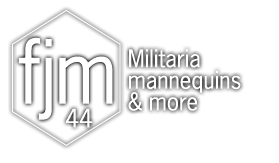ww2
Showing 14341–14400 of 17190 results
-

US WWII D-Day assault vest
A scarce and iconic Assault Vest as worn during D-day by members of the 1st, 4th, and 29th Infantry Divisions as well as the 2nd Ranger Battalion. The vest is a stunning original mint example marked Harian 1944 and in a good size Medium to fit most if not all modern mannequins. There are no repairs or modifications on the vest. The vest is a textbook example in mint condition in OD3, would be impossible to upgrade and the centerpiece for any D-Day themed collection!
-
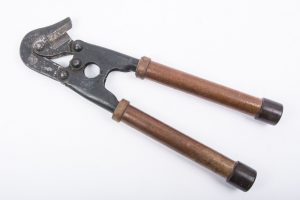
German pioneer wire cutters dated 1938
Nice pre war German pioneer wirecutters marked Hugo Linde Deltawerk Solingen 1938.
-
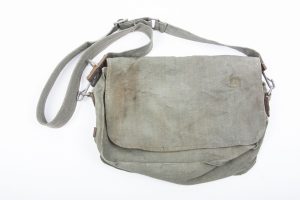
Female M31 Brotbeutel for Helferinnen
A very nice M31 breadbag for Helferinnen in the Wehrmacht. Rare to find!
-
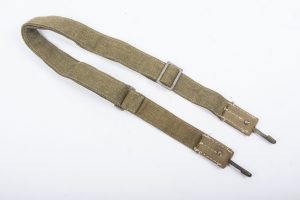
Tropical breadbag strap
Very nice original tropical breadbag strap.
-
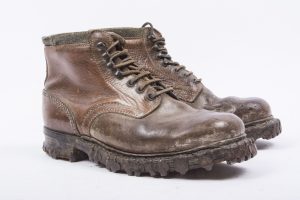
Lightbrown Gebirgsjäger boots
A nice pair of Gebirgsjäger boots in good used condition. The size is a nice average, not too small or big. The wool on the top is in good condition and the set comes with the original leather laces. A nice pair to finish a mannequin with!
-

Late war Waffen-SS erbsentarn trousers
Late war Waffen-SS Erbsentarn camouflage trousers. The trousers are a very good substitute if you don’t want to spend twice the price but need a original pair for a mannequin. The trousers are in worn condition and have been washed, at one point where dyed blue. The trousers retain its original glass and metal buttons and is marked in the rear as it should. The size is a medium fitting most modern mannequins.
-
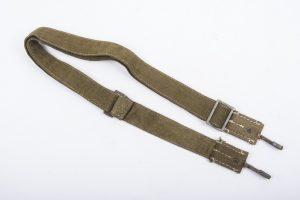
Tropical breadbag strap
Very nice original tropical breadbag strap
-
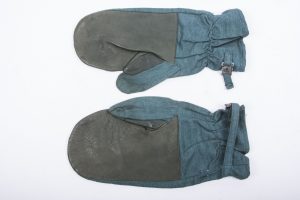
Polizei issue mittens
Late war Polizei issue mittens in mint condition.
-
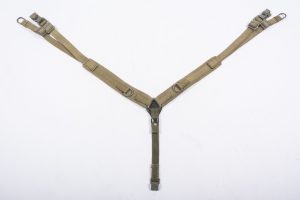
Tropical Y-straps marked Bruno Leuner 1942 Bretnig
A textbook mint tropical Y-strap marked Bruno Leuner 1942 Bretnig. Impossible to upgrade!
-
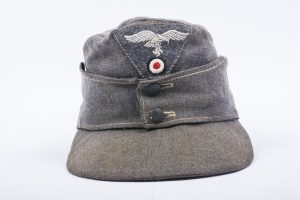
Luftwaffe M43 cap in lightweight material marked RBNR
Stunning untouched Luftwaffe M43 cap marked RBNR 0/0454/. The cap retains its factory sewn Luftwaffe trapezoid. Very rare original lightweight Luftwaffe M43 cap in very good used condition.
-
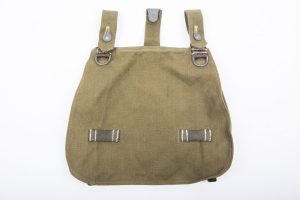
M31 breadbag with rayon straps marked RBNr.0/0750/3572
A stunning mint breadbag marked RBNr.0/0750/3572. Interestingly the straps are made of webbing and rayon, a uncommon and very late war feature. Exceptional breadbag!
-
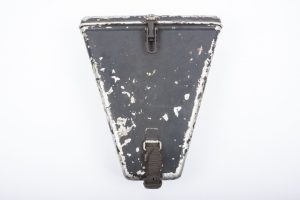
Luftwaffe Entfernungsmesser case for shoulder supports
A very nice aluminum transport case for the Entfernungsmesser shoulder supports. The case retains its original factory paint and internal dividers. Nice piece to complete your entfernungsmesser!
-
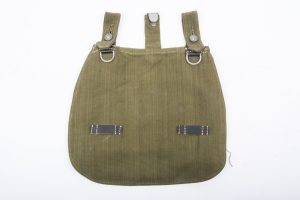
Mint unissued breadbag
Superb breadbag in mint condition. For sure the best one I’ve had to offer. If you just want one mint example and want the nicest one out there; this is it.
-
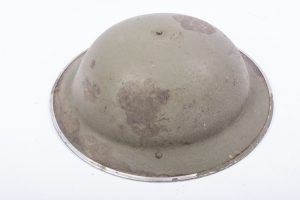
British MKII helmet
Very nice 1943 dated MKII helmet in very good used condition.
-
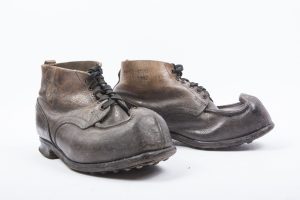
Rare Waffen-SS Gebirgsjäger issue ski boots
Sale!Scarce original Waffen-ᛋᛋ Gebirgsjäger issue boots in very good used condition. The boots come with their original insoles. The boots are matching and marked 42 – 11 – 1570 ᛋᛋ 1942. These boots where worn mostly on the eastern front by ᛋᛋ-Gebirgsjäger and ᛋᛋ-Skijäger. Very rare and typical pair of Waffen-ss issue boots
-
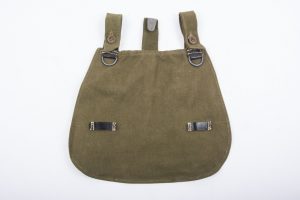
Mint M31 breadbag
M31 breadbag in mint condition. Excellent piece that would be hard to upgrade.
-
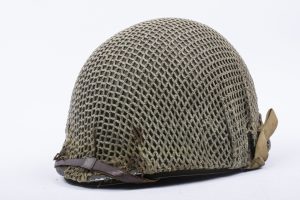
US M1 fixed bale helmet with period applied net
A great US M1 fixed bale with period applied helmet het in very good, lightly used condition. The McCord helmet shell retains most if not all of its factory textured paint and the period applied helmet net. The helmet comes with its original Westinghouse liner in very good condition named AB Vann on the exterior. The helmet is overall in great, lightly worn condition and the name would be a nice base for further research. Very hard to find a US m1 helmet with a period applied helmet net!
-
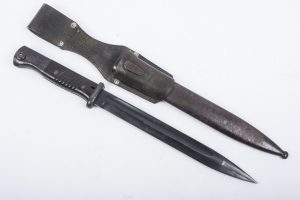
Matching K98 bayonet E.u.F. Hörster 1939
A very nice 1940 dated bayonet with leather frog. Nicely marked E.u.F. Hörster and dated 1939. The bayonet is matching and with most of its original blueing. Hard to upgrade 1939 dated matching bayonet with original pre war frog!
-
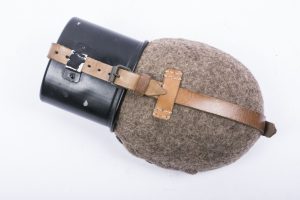
M31 canteen marked MKL 42
A very nice M31 canteen in near mint condition. All the parts are marked MKL 42 indicating production by Max Kamper, Lüdenscheid. The canteen comes with a very nice lightbrown leather strap. A rare to find maker, especially in this complete and near mint condition!
-
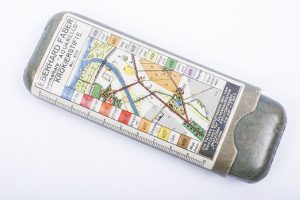
Rare map drawing pencils or Krokierstifte by Eberhard Faber
Rare paper case of third reich era map drawing pencils or Krokierstifte by Eberhard Faber. One of the hardest to find map case accessories. The case comes with a variety of pencils that where found inside the case.
-
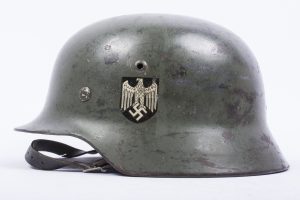
M35 ET66 Heer apple green double decal helmet
A very nice original double decal Heer M35 helmet in very good condition. The Heer decals still retains up to 95%. The helmet is marked ET66 indicating production by Eisenhüttenwerke, Thale. The helmet retains its original liner and chinstrap marked and dated 1938. The helmet is a very nice and typical example of a double decal Heer M35 helmet!
-
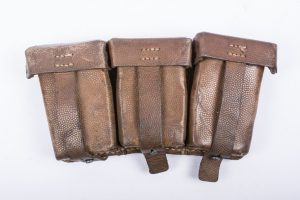
Lightbrown k98 pouch marked 0/0396/0027
A very nice lightbrown K98 pouch marked 0/0396/0027 with all dividers and undamaged.
-
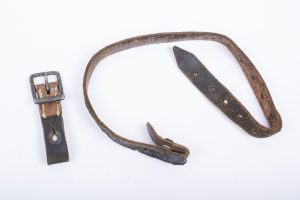
German helmet chinstrap G. Schiele Loburg
A very nice mid war chinstrap in good used condition. Very hard to find a used one to match with a used helmet. Nicely marked G. Schiele Loburg 1942.
-
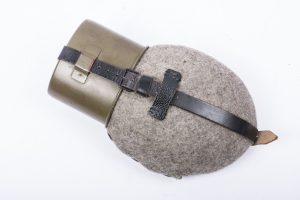
Matching M42 canteen marked CFL 43
A very nice matching M42 canteen with a black strap in good supple condition. Nicely marked CFL43 indicating production by Carl Feldhaus Aluminium-und Metallwerke, Lüdenscheid. Hard to find or upgrade M42 canteen with black leather strap!
-
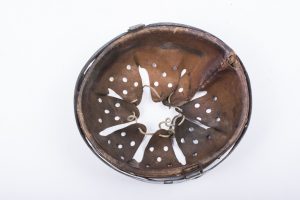
German helmet liner 62/55 Schuberth
Nice original German helmet liner marked Schuberth for a size 62 helmet shell.
-
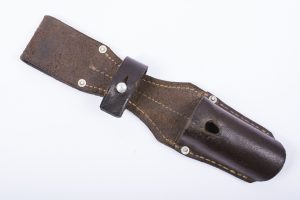
Pre war brown leather k98 bayonet frog
Nice unblackened example of a pre war K98 bayonet frog in very good condition. The frog is dated 1937 which is more obvious in hand and hard to photograph. The leather is supple and the hardware is all aluminum. Textbook pre war piece.
-
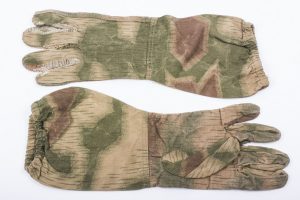
Heer/Luftwaffe Sumpftarn sniper gloves
A fantastic pair of Sumpftarn sniper gloves in lightly worn condition. These gloves show a nice patina and are perfect for a combat mannequin. The size is nice and medium to large.
-
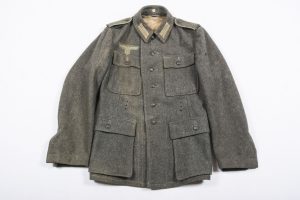
Italian wool Heer M43 EM tunic
A late war Italian wool M43 Heer field blouse in good used condition. The tunic is a nice large size fitting most if not all modern mannequins. The tunic comes with factory machine sewn Litzen, a restored breast eagle and a set of late war shoulderstraps with repaired tongues. Late war combat tunic in good used condition complete with shoulderstraps!
-
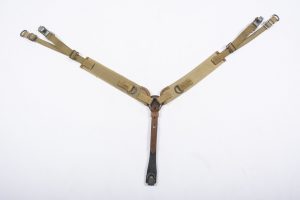
Y-straps manufactured from British webbing in Wirtschaftsamt Litzmannstadt
These Y-straps are made in the Ghetto of Lodz, Poland which the Germans renamed into “Litzmannstadt”. They are made using parts of captured British equipment items. These British equipment items where left in 1940 when the British Expeditionary Force evacuated to the United Kingdom. The Germans sent these for recycling and a lot of work was put in disassembling every British equipment piece and recycling the individual parts into German army equipment. Y-straps, breadbags, A-frames and rucksacks are a few of the items made in Litzmannstadt. A very rare pair of Y-straps!
-
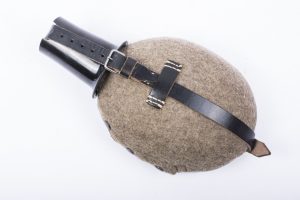
Mint M42 canteen marked SMM 45
A stunning M42 canteen marked SMM45 indicating production by Süddeutsche Metallwarenfabrik, Mussbach. The canteen is unissued and would be very hard to upgrade. 1945 dated items are very rare!
-
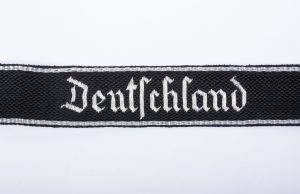
Mint Waffen-ss RZM pattern flatwire cufftitle Deutschland
Sale!Superb and textbook original RZM-pattern officers flatwire cufftitle for SS-Verfügungstruppe Deutschland. Nice early early RZM-pattern flatwire production with the Gothic style script. The cufftitle is in full length mint condition. Very nice original Waffen-SS cufftitle!
-
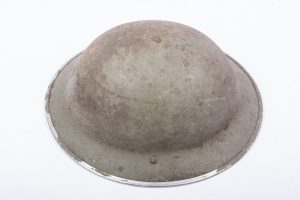
British MKII helmet
Very nice 1943 dated MKII helmet in very good used condition.
-
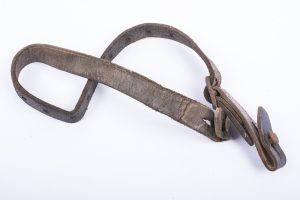
German helmet chinstrap in used condition
German helmet chinstrap in good used condition. Very hard to find a used one to match with a used helmet.
-
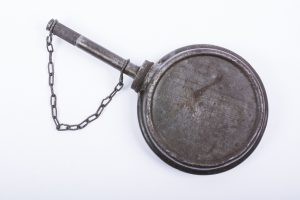
MG34 oiler marked Madler 39
Very nice pre war MG34 oiler marked Madler 39 in very good lightly used condition and its original wartime finish.
-
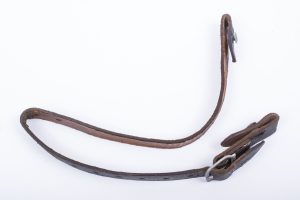
German helmet chinstrap R Ehrhardt Poessneck 1941
A very nice mid war chinstrap in good used condition. Very hard to find a used one to match with a used helmet. Nicely marked R Ehrhardt Poessneck 1941. The chinstrap is a nice early example with aluminum hardware. Perfect for a early helmet!
-
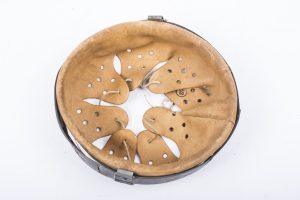
German helmet liner 60/53 1943 B&C litzmannstadt
Nice original German helmet liner marked B&C Litzmannstadt 1943 for a size 60 helmet shell. One of the rarest sizes to find!
-
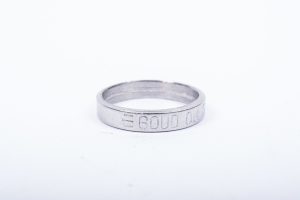
NSB ring Goud om Staal 1940
Nice original ring for members of the Dutch National Socialist Movement. As the moment was low on funds in 1940 they started a campaign where members could trade in precious metals as gold or silver for this ring. Nice small period item!
-
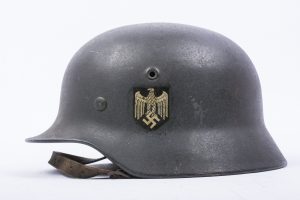
Named Q64 M40 Single decal Heer helmet
A textbook Heer M40 single decal helmet marked Q64 indicating production by Quist. The helmet is complete with its original liner and chinstrap that are original to the helmet. The liner and chinstrap is original to the helmet and in good light used condition. The chinstrap is full length, supple and marked. The liner is named to Ufken. The helmet retains up to 90% of its original factory paint and 95% of its decal. All in all a very nice helmet in very good condition.
-
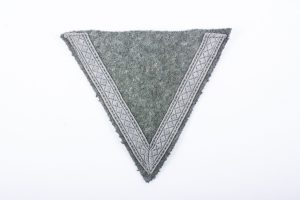
Late war Heer Gefreiter chevron with late subdued tresse
A very nice mint and unissued late war Gefreiter chevron with late subdued Tresse.
-
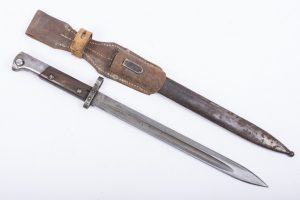
Czech VZ-24 bayonet with light brown frog marked 0/0655/0013
Pre war Czech bayonet for the VZ 24 rifle in very good, untouched condition with a very nice lightbrown k98 bayonet frog marked 0/0655/0013.
-
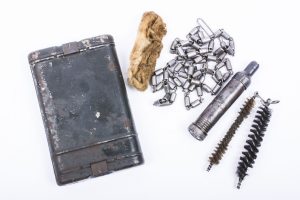
Late war RG34 marked arr 43 with last model steel stamped oiler
A very nice late war RG34 marked arr 43 indicating production by Braunsweigische Blechwarenfabrik G.m.b.H., Braunschweig. All the parts are matching for this particular maker and model and it includes the last model “last ditch” steel welded oiler. A rare type to find!
-
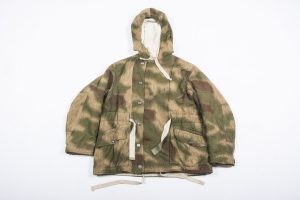
Reversible Wendejacke in Sumpftarn camouflage
A nice original tan and water or Sumpftarn Wendejacke in very good condition. The parka retains all buttons, straps and cords. The parka is in near mint condition and retains its nice bright camouflage colours. The parka has one or two small holes and one repair of the end of the sleeve. A very nice late war combat parka!
-
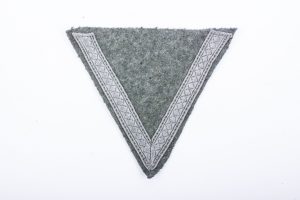
Late war Heer Gefreiter chevron with late subdued tresse
A very nice mint and unissued late war Gefreiter chevron with late subdued Tresse.
-
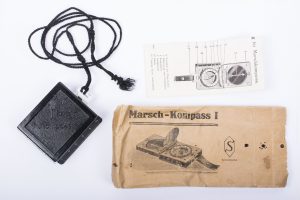
Marschkompass in factory wrapping
A very nice Marschkompass for the Hitlerjugend in its issue paper factory wrapper with manual.
-
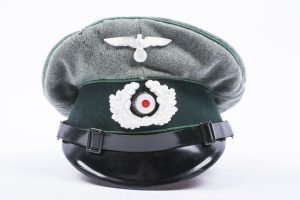
Heer Gebirgsjäger EM/NCO visor cap dated 1938
Very nice lightly worn EM/NCO visor for Gebirgsjäger troops in very good condition nicely dated 1938. The cap is a nice large size 58,5 cm. The cap retains its original insignia. There are a few small insect bites but otherwise its very nice, flexible and a great looking cap!
-
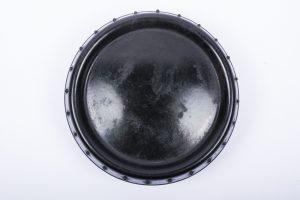
Black bakelite butterdish
A nice original black butterdish with the late fine thread. It opens in a quarter of a turn like it should and is in great condition without cracks or damages. It is marked on both parts.
-
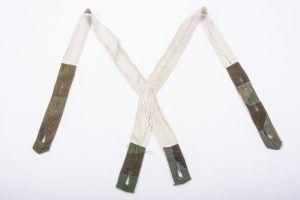
Reversible parka suspenders for Splittertarn and Sumpftarn trousers
Very nice parka suspenders in good condition.
-
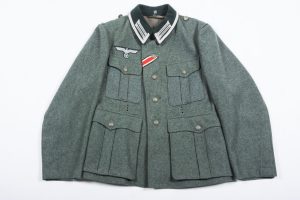
Minty Heer M36 Infantry NCO field blouse
Stunning NCO M36 field blouse in unissued condition. The garment features its full length skirt, sleeves and waist and is not tailored. The wool still retains 100% of its original nap and would easily be classed as mint. The garment has zero holes or damages. The insignia on the garment are original and period factory applied to the garment. The garment is a medium size for modern mannequins. The garment is a perfect example of a M36 NCO garment that would be impossible to upgrade. Perfect for a May 1940 display!
-
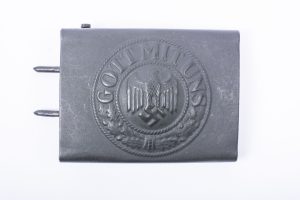
Late war blue Heer belt buckle by Heinrich Arld, Nuernburg
A very nice late war blue belt buckle or Einheitskoppelschloss in near mint condition made by Heinrich Arld, Nuernburg. The belt buckle still retains 100% of it’s original factory paint! A very nice Heer belt buckle that would be hard to upgrade!
-
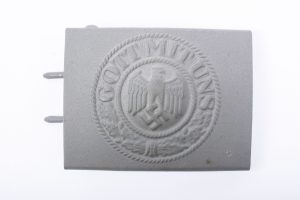
Mint steel Heer belt buckle marked RZM4/44
A mint steel Heer belt buckle marked RZM M4/44 indicating production by Paul Cramer & Co., Lüdenscheid. Hard to find RZM marked Heer buckle.
-
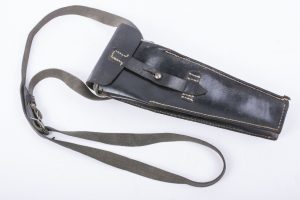
K98 grenade launcher pouch DKK42
A leather pouch for the K98 grenade launcher with its original sling. Nicely marked dkk 42 indicating production by Friedrich Offermann u. Söhne, Lederwarenfabrik, Bensberg.
-
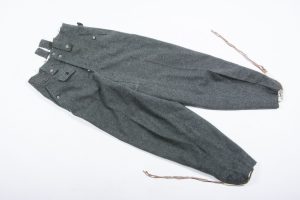
Waffen-SS issue EM/NCO M43 keilhosen in mint condition
Scarce original pair of Waffen-SS M43 Keilhosen for enlisted man and non commissioned officers in stone mint condition. The trousers retain all of their originally sewn buttons and full leg ties. The inside of the trousers are nicely finished with herringbone rayon material typical for Waffen-SS issue garments. The cut is typical for Waffen-SS issue Keilhosen with straight cut pockets and the back reinforcement ending at the side seams. The trousers have zero damages, repairs, missing buttons or any hidden issues. The size is a nice medium fitting most modern mannequins. Not to be confused with Heer/Kustenartillerie trousers! A textbook Waffen-SS M43 Keilhosen, much harder to find then a pair of Erbsentarncamouflage trousers!
-
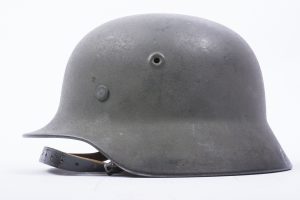
Mint Q60 M40 no decal helmet
A very rare size 60 Quist M40 no decal helmet. The shell is marked Q60 indicating production by Quist. The size 60 is equally rare as the size 70 helmets and where only made in very small batches with very little surviving examples. The helmet retains its originally fit liner and chinstrap that are original to the helmet. The helmet comes in the small size that was meant for very young or small soldiers. The helmet is a unissued example of a textbook late war rear marked Quist no decal M40 helmet in top condition that would be very hard to upgrade. A must have for any helmet collector as it is of the super rare size 60 shell…
-
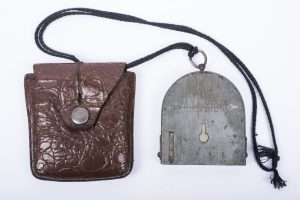
Pre war Bezard compass with pouch
A very nice pre war Bezard compass in good, used condition.
-
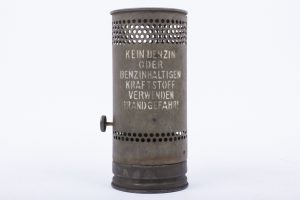
Wehrmacht issue vehicle heater
Excellent condition German vehicle heater in very good, undamaged and probably working condition. The heater retains the full embossed and stenciled text and is nicely dated 1942.
-
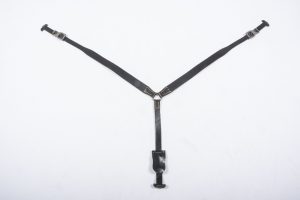
Lightweight Y-straps Pinneberg 1941
Excellent lightweight Y-straps in very good, unissued mint condition. Nicely marked Pinneberg 1941.
-
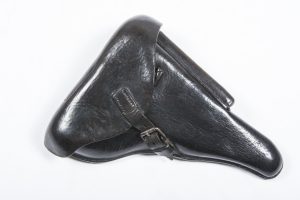
Pre war P08 Luger holster dated 1938
A textbook pre war P08 Luger holster in good used condition. Nicely mdated 1938. The holster is complete with all loops, straps and buckle. The leather is supple and not dry. Hard to upgrade pre-war piece!
-
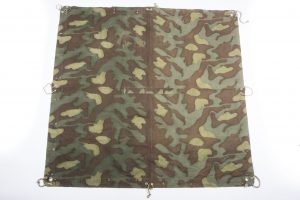
Rare German made (!) square Telo Mimetico Zeltbahn alter Art für technische Zwecke
A rare Telo Mimetico Zeltbahn alter Art für technische Zwecke. These where made after the pre war model as the triangular model was not suitable enough for the purpose of radio equipment. This one must not be confused with the Italian or French post war Zeltbahn which are also square and photographed in comparison in the last photograph. The zeltbahn is in good near mint condition and has most if not all of its originally sewn buttons and ropes. I have only ever seen 1 of these and one could say these are very rare!
-
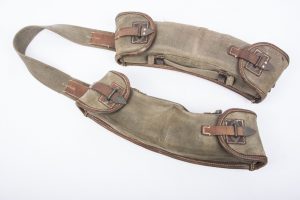
MG13 magazine pouches
A set of matching magazine pouches for the MG13 light machine-gun. Very nice pre war construction and in very good, lightly used condition. The pouches are filled with paper and come without magazines.
-
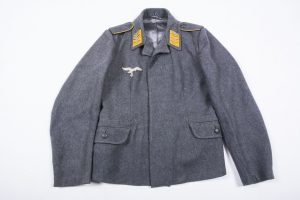
EM Luftwaffe Fliegerbluse
Nice original Luftwaffe Fliegerbluse in good used condition with resewn original insignia.
Showing 14341–14400 of 17190 results
